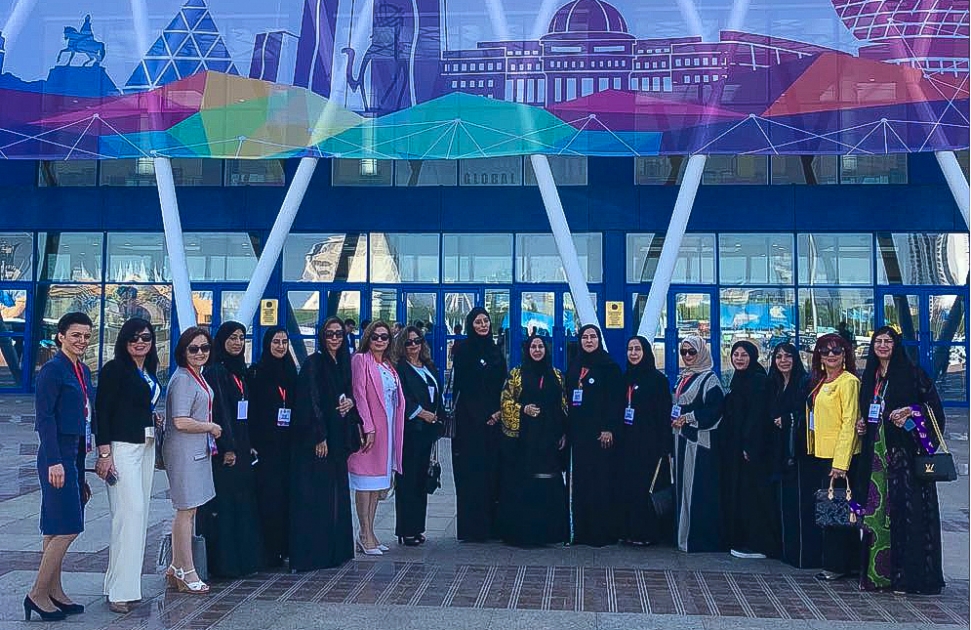
Emirates BWC and NAMA Highlight the Need for Better Integration of Women in Economy at Kazakhstan’s Global Silk Road Forum
Women are essential to the realisation of UAE Vision 2021 and UAE Centennial Plan 2071
Reem BinKaram: Women constitute 70% of university graduates in the UAE
For immediate release
Astana, Kazakhstan, July 3, 2018
The Emirates Business Women Council (Emirates BWC) and NAMA Women Advancement Establishment (NAMA) have represented the UAE at the Forum of Mayors of the Cities of the Silk Road Countries “Global Silk Road”, which took place in Astana on July 2 and 3, marking the 20th anniversary of Astana becoming the capital of Kazakhstan.
The two-day event presented these entities an opportunity to explore new ways to stimulate international cooperation in trade with a particular focus on the role of the Arab region situated at the intersection of the ‘Belt and Road’ initiative (BRI) that connects Asia, Africa and Europe and supports sustainable development goals by opening access to markets in different countries.
The 15-member delegation included representatives of the Emirates BWC headed by HE Farida Abdullah KamberAl Awadhi, Emirates BWC Chairperson, while NAMA’s representatives were led by their Director, Reem BinKaram.
Global Silk Road Forum shed light on several global challenges faced by members of the Shanghai Cooperation Organisation, and discussed issues related to the digital impact of the Silk Road in the 21st century and the new form of regulating international cooperation in business and scientific support and topics about the empowerment of women and youth and non-government organisations.
In her keynote address, HE Farida Al Awadhi highlighted that the UAE is reinforcing its long-term strategies and efforts geared towards providing women an equal playing field, equal opportunities and equal participation in the enforcement of national development goals as these will be key indicators of their realisation of UAE Vision 2021 and the UAE Centennial 2071 Plan.
These efforts, she noted are being led by HH Sheikha Fatima Bint Mubarak, Chairwoman of the General Women’s Union, President of the Supreme Council for Motherhood and Childhood, and Supreme Chairwoman of the Family Development Foundation.
“UAE’s efforts to further women’s access to economy, ensure children’s welfare and support Emirati families have gained regional and international recognition, particularly with the launch of theNational Strategy for the Empowerment and Leadership of Women in the UAE 2015–2021,” Al Awadhi said.
The strategy aims to provide a guiding framework for women’s inclusion to federal and local government authorities, private and civil community organisations to implement in their processes, which will ensure that women have opportunities to lead, initiate and participate equally in the UAE’s sustainable development process.
Female-owned businesses account for nearly 10% of the UAE’s private sector, including over 48,000 SMEs. Al Awadhi called on the forum’s attendees to strengthen international partnerships by leveraging UAE's strategic location, business-friendly environment and advantages offered to women-owned and led businesses to stimulate transfer of knowledge and boost progress, especially in the field of finance in which UAE boasts both intellectual and economic leadership.
Reem BinKaram has shed light on the pioneering effort of NAMA and its affiliates, such as Irthi Contemporary Crafts Council, Sharjah Business Women Council, NAMA’s Badiri Education and Development Academy, which builds women’s capacities through a variety of professional programmes and resources.
BinKaram shared important statistics on the economic role played by UAE’s women, and how that substantially impacts national and regional growth. She partly attributed this to the strong academic infrastructure in the UAE, 46 percent of whose science, technology, engineering and mathematics (STEM) graduates are women.She also noted that 77 percent of Emirati women enroll in higher education after secondary school and make up 70 percent of all university graduates in the UAE.
Highlighting that the UAE’s SMEs sector is expected to reach 70 percent of the non-oil GDP in 2021, BinKaram has urged political decision makers and representatives of economic bodies and institutions to include women in their global development plans and stressed the need to strengthen efforts for the equal representation of women in the world economic structure.
During their participation, the UAE delegation also met with HE Gulshara Abdekalikova, State Secretary of the Republic of Kazakhstan, Chairman of the National Commission for Women, Family and Demographic Policy under the Presidency of the Republic of Kazakhstan to discuss possible areas of cooperation in enabling women in the two countries more prominent economic roles.
The new Silk Road reaches more than 60 countries with a projected investment of USD 8.4 trillion and serves 4.4 billion people, equivalent to 63 percent of the world's population. The volume of China’s exports through this route 500 billion US dollars, which has significant implications for the Gulf region and the Middle East, which in turn offers the UAE a sizeable opportunity to benefit from this through the increased representation of women on the global silk road.

























